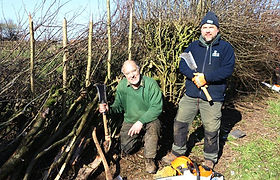
About ORSN
"The name of our proper connection to the earth is “good work,” for good work involves much giving of honor. It honors the source of its materials; it honors the place where it is done; it honors the art by which it is done; it honors the thing that it makes and the user of the made thing. Good work is always modestly scaled, for it cannot ignore either the nature of individual places or the differences between places, and it always involves a sort of religious humility, for not everything is known. Good work can be defined only in particularity, for it must be defined a little differently for every one of the places and every one of the workers on the earth"
-Wendell Berry
Getting Started, Getting Connected
In the quote above Wendell Berry captures what many of us feel about working with our hands. Their is an immediate, visceral connection between mind, body and the work being undertaken. There is a mindful quality bought about by focus where what matters is the work in hand, not the burdens of the past or worries about the future. Their are many benefits to learning a new skill with increasing evidence for supporting positive mental health into old age. But working with tools, learning a skill can bot self-esteem and resilience in young and old alike.
Learning a traditional skill connects you seamlessly with those who have come before, but it doesn't commit you to living in the past. Traditions are best when they can adapt to new horizons. The skills on these pages have relevance today as we try to transform our growth-hungry economies into sustainable communities. Traditional skills can also foster respect for and stewardship of the environment and could therefore play a role in tackling climate change and habitat loss.
Starting a new journey? Looking to deepen your skills and connection? Looking to share your passion? The Ontario Rural Skills Network has something for you.
Hedgelaying in Ontario's Landscape and ORSN
In 2016 the University of Waterloo and partners in southern Ontario, funded by the Social Sciences and Humanities Research Council, began working together to examine landscape planning and management practices within the Greater Golden Horseshoe, using hedgerows and hedgelaying with reference to broader themes including place-making, collective stewardship, agro-ecology and resilience. Three pilot plantings at Mount Wolfe Farm, Albion Hills Community Farm, and a private property in Inglewood were undertaken.
In 2018 the project team, working with Mount Wolf Farm and the Oak Ridges Moraine Institute of Applied Sustainability (ORIAS), set up the Ontario Rural Skills Network Pilot Project to bring together skilled practitioners, hobbyistss and interested newbies into a supportive community exploring the role of traditional skills in creating transformation pathways and developing resilience.
Jim Jones, an ecologist, hedgelayer and green woodworker from the UK, will be working with the project offering advice and delivering workshops on hedgerows, hedgelaying and other traditional rural skills and acting us a 'curator' of this new space. Find more about the project here
ABOUT ME
I'm a Visiting Scientist at the Waterloo Institute of Sustainable Innovation and Resilience (WISIR). I am on sabbatical from Surrey Wildlife Trust in the UK where I am Living Landscapes Project Manager specializing in developing and managing projects addressing landscape connectivity issues with citizen science solutions.
A trained mammal ecologist, I developed a passion for hedgerows and hedgelaying working as 'Hedgerows for Dormice' officer for the Peoples Trust for Endangered Species. Recognising the value of hedgerows for addressing landscape connectivity issues in some contexts, and the potential of hedgelaying in developing socio-ecological linkages, I established Hedgerow Heroes, a Citizen Science project at SWT. I am also a member of Hedgelink, the UK Technical Advisory Group on Hedgerows
My current interests lie in exploring pathways to socio-ecological resilience through non-rational drivers of change, and in becoming a better hedgelayer and spoon-carver!

Jim Jones (standing) with Hedgelink colleague Nigel Adams at a hedgelaying demonstration for the 'Tous Eco-Citoyens!' launch in Meteren, France


